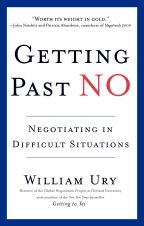Getting Past No
A book review.

Getting Past No
Negotiating in Difficult Situations
by William Ury
published: 1991.09
ISBN: 9780553371314
genre: Business (Management)
reviewed:2012.05.23
👍🏼👍🏼 a favorite!
This is, perhaps, the book I've recommended more frequently than any other.
The author discusses a five-part approach negotiating with a counter-party that might be unwilling or disinterested in a resolution.
Ury advocates that it's impossible to deal with someone else's difficult behavior without managing your own. My favorite of his strategies is "going to the balcony." By this he means to imagine yourself observing the conflict you're engaged in from a safe distance - you're in the audience watching yourself perform. This trick is designed to take you out of the emotional state of perhaps being threatened or feeling that you have to react. By imagining yourself an observer, you focus on picking up on what your opponent is really saying, how they're saying it, the body language they're using, to observe their tactics, and understand how you can utilize tools like active listening. The detachment allows you to remain focused on the mechanics of getting through your opponent's positions and focus on your goals.
Ury also advocates for the identification of a "best alternative to a negotiated settlement" (BATNA). He suggests that you identify this prior to going into the negotiation, and to understand when it's time to walk away. Walking away is another technique the author sites as a mechanism for giving yourself time to properly evaluate things.
Perhaps my favorite idea in the book is to separate positions from goals or interests. Positions are immediate ideas about the outcome, versus goals which are the underlying objective. The difference being "how" versus "why" matters. Often people enter a negotiation thinking that the "how" questions are the only way to go - that is, they think they know how to resolve the matter through certain next steps or perhaps the framing of a contract. And these positions stop other solutions from entering the picture. It's separating those positions from the underlying goals that matter.
To do so, Ury suggests that we keep asking "why" to understand the people with whom you're negotiating. I've done this many times even in non-negotiation settings, "Why do you say that?" or "What makes you say that?" being some of my favorite forms. I find this invaluable in all manner of planning activities. Ury also suggests asking "what if" questions, and using "yes" wherever possible to set the conversation in terms of "yes" rather "no".
The final matter is to "build a golden bridge" which offers a path from the current impasse to a place of mutually-acceptable outcome. This bridge must be of mutual creation, and that will only be possible when the other party's sources of resistance are recognized in a way that allows them to feel valued and respected. Recognizing that change overload is an issue, he suggests breaking up the amount of change into a palatable series of components. Recognizing that personal resentment can be an outcome of the negotiation process, he advocates for bringing third parties to deliver advice.
When all else fails, Ury suggests pointing out that the counter-party may have to adopt an unsuitable alternative to a negotiated outcome. Test their grip on the realities by asking them more questions about those outcomes. Advise them of your own BATNA.
This is one of my favorite books not only for its content but for the clarity with which it's written. My paperback copy - now beaten from multiple lendings (I found the business card of someone I've never met as a bookmark from the last lending) - is only two hundred pages long. I have taken courses with titles like "Influence without Authority" and "Influence and Negotiation" and really enjoy the subject. This book has a lot to offer.